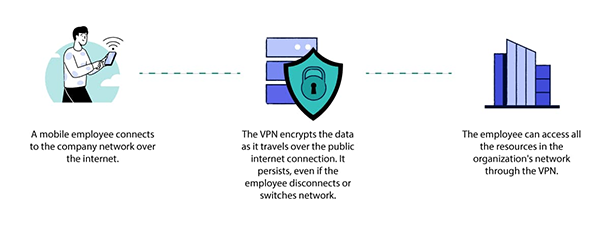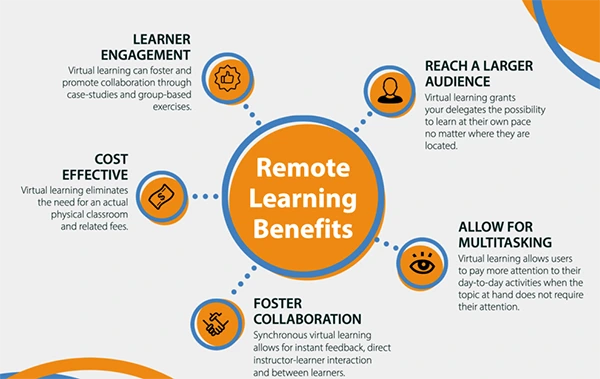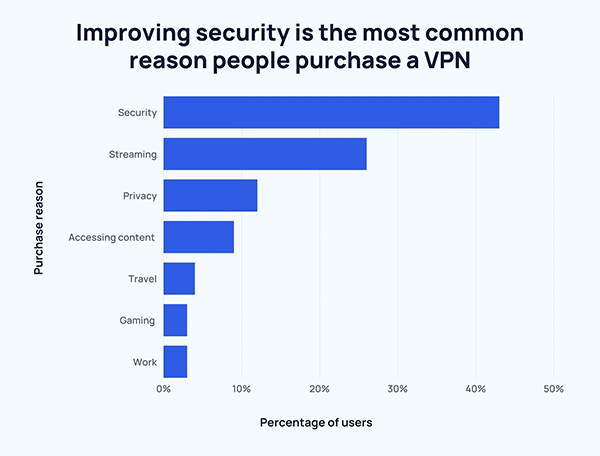
Remote work and learning were easily adopted during COVID-19, but now it has become the new professional norm. Modern industries have shifted to either hybrid or completely virtual workspace powered by VPN.
According to research by Go-Globe, approximately 25% of internet users worldwide have used a VPN once in the last 30 days.
With so many local internet service providers, why opt for VPN for global teams?
Two hindrances prevent a seamless online workflow – cyberattacks and limited international access. VPN is the best solution to reroute user traffic through an encrypted tunnel.
Read on to find out how VPNs empower the growing need for comprehensive training, and pave the way for society to progress fearlessly.
Secure Access to Proprietary Resources

Investing in a secure network is the most important priority for any company to protect valuable data from every type of cyber threat. But how can you work properly if you don’t have access to relevant company data? Therefore, enterprises integrate different types of VPNs as per their workload.
Four kinds of VPNs can be utilized by an organization – remote access, site-to-site, client-based, and network-based.
Companies employ different methods to ensure complete data protection, such as:
- Workers are reminded and updated about the best online practices to mitigate risks from phishing, malware, email scams, data leaks, etc.
- Employing a VPN solution helps strengthen cybersecurity to mitigate these issues.
- VPNs send user traffic through secure encrypted tunnels, protecting against tampering while in transit.
- This enables employees to engage in secure remote access by using a simple VPN solution like 1Click, which ensures that all proprietary data can be accessed securely.
In this way, organizations can feel secure in creating and expanding a bank of vital learning and development resources for remote employees to use.
THINGS TO CONSIDER
Opt for a VPN provider that offers a reliable and stable connection. Conduct speed tests for different server locations to determine performance consistency.
The Ability to Utilize Learning Platforms

Online upskilling is necessary in this digital age, and a VPN network offers accessibility to various learning platforms. When remote employees are well-connected to the organization, they are inspired to contribute enthusiastically to the work progress.
This learning extends to both hard and soft skills. Free as well as certified technical courses are available online that add more value to your existing resume while you are working for a company. For developing soft skills, team meetings could be utilized to learn about each other’s preferences, practice active listening, ask for feedback, etc.
Virtual Private Network makes online training beneficial because it is cost-effective, fosters collaboration, and allows better work-life balance. In this regard, cloud VPNs ensure connecting to larger resources for e-learning and learners can get certified from an international university while sitting at home.

STATISTICS
The graph shows that most people prefer to use a VPN because of security reasons.
Ensuring Consistent Learning Experiences
Working from anywhere can also become strenuous if the network is inconsistent or is disturbed by weather conditions. Though remote workers can manage online connectivity while working from home, it could be challenging for nomad workers or people who face technical problems.
With a powerful VPN, this issue is easily resolved along with data privacy and secure remote access, it also offers a streamlined workflow without any interruptions.
Companies like Microsoft and IBM successfully transitioned their employees to complete remote work due to strong VPN encryption protocols such as AES-256 to encode data.
They overcome geographical barriers for secure collaborative channels. While protecting confidential corporate information, they also safeguard the financial data of a company.
Other steps that modern companies implement to ensure consistent learning experience are:
- Convenient logging policies
- Compatible devices and operating systems
- Regularly checking VPN uptime stats
- Providing customer support in case of unexpected downtime
- Conducting timely security audits
- Tailoring access control based on job roles
- Collaboration with IT team
These are some of the factors that make a big difference and help companies and employees stay productive and secure while working remotely.
Future Trends in VPN Technology
As technologies become advanced with the integration of automation and AI, it is imperative to notice that VPN technology is also progressing for modern employees.
Key trends to watch out for in the future include:
- Zero Trust Network Access to ensure better security, confined to specific users only.
- Cloud-Native VPNs for seamless integration with cloud infrastructures.
- Post-quantum encryption for quantum computing that is faster and more secure.
- Real-time threat detection by using advanced AI algorithms.
- Decentralized VPNs and blockchain integration for automating security protocols.
Wrapping Up
The digital age has made overwhelming progress in a short time due to the integration of automation. Even before that, VPN had already made its mark in the networking world by providing secure connectivity options.
Whether in the future, companies decide to go completely remote or adopt a hybrid mode, different types of virtual private networks prevent many cyberattacks. They also offer speed and foster a consistent learning environment that benefits employees as well as the organizations to achieve all their goals.